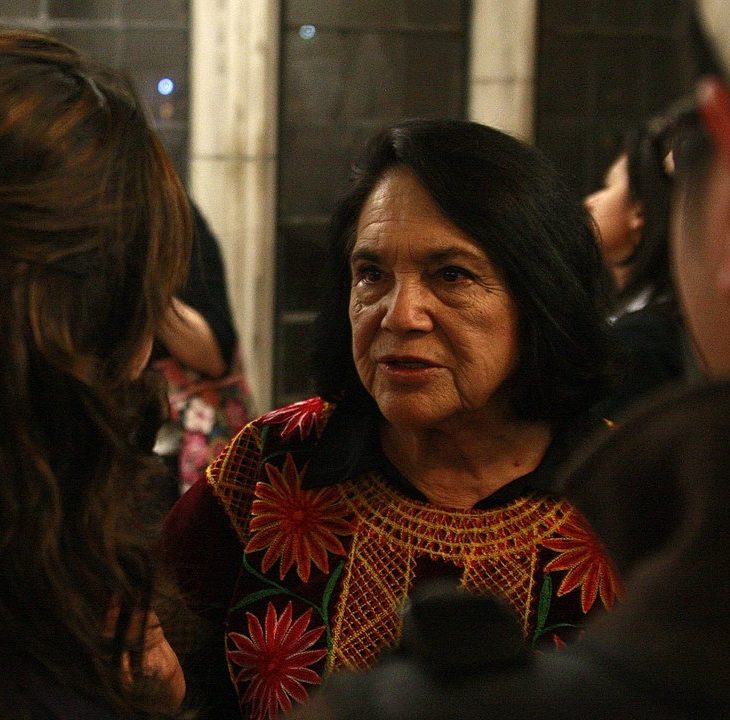Being With Dolores
January 22, 2021

Dolores Huerta’s presence is palpable in and around our campus through images, posters, pictures, and words found within student spaces and faculty and staff offices. She is a role model to many disenfranchised communities of color, especially in the Latino/a community, among civil rights activists, and to young people throughout America, and she has significantly touched the University of La Verne, a Hispanic Serving Institution in Southern California.
Dolores is a civil rights activist who, with Cesar Chavez, co-founded the National Farmworkers Association, helped organize the Delano grape strikes and the national grape boycotts of the 1960s. Her life’s work continues through the Dolores Huerta Foundation as a social justice organizer for laborers, women, children, youth, and the LGBTQIA+ community.
Some of the posters on our campus are decorated with her signature, others bear her phrase, “Sí, Se Puede!” that became the motto for the United Farmworkers of America and a common phrase in civil rights and immigration movements ever since. Over the past 10 years, our campus has developed a special relationship with Dolores and the Dolores Huerta Foundation. She has visited our campus and shared with our students, and a few of our students who participate in our Summer Service Program have had the opportunity to volunteer for 10 weeks at the Dolores Huerta Foundation. The most common story I hear from our student interns is about when they first met Dolores. With her boundless energy, Dolores greets the students and a few moments later, they find themselves swept up and on their way with this national icon to a demonstration, a protest, a solidarity rally, or an important meeting at the state capitol.
My colleague, Daniel Loera, Director of the Center for Multicultural Services, describes being in the presence of Dolores, especially for our students, as an experience of convivir – “to be with,” an experience of closeness that is moving, beautiful, touching and empowering. She is a role model, a living legend, an icon of putting one’s life on the line for justice and human dignity. The closeness of being with her is deeply inspiring.
Another colleague, Nora Dominguez, who as a child worked in the fields and directly benefited from Dolores’ social justice efforts to improve working conditions, and the Director of our Bakersfield campus, describes Dolores’ life work as transformational. Dolores is always about empowering the next person through encouragement, building their capacity, agency, leadership and self-sufficiency to create the changes needed to improve their lives. Our students who suddenly find themselves with Dolores on the steps of the state capitol are not standing alone, they are supported by her encouragement: “You have a voice, let’s go use it!”
Dolores Huerta’s work resonates strongly with some of higher education’s most aspirational goals. She draws upon the transformative power of learning and personal development as a way to instill agency and voice. She inspires people and provides the tools for people to become active, civically-engaged individuals who can build up their communities and then pay it forward by empowering others. For those of us who are compelled by the liberatory nature of education, Dolores’ work points us toward strategies for building greater equity, inclusion, and justice. Through her foundation, she addresses multiple forms of economic and social injustice simultaneously, creating the necessary conditions for a comprehensive vision of community and justice that includes everyone. Like many of our institutions of higher education, Dolores advocates for teamwork, with an emphasis on building networks of solidarity and authentic community – spaces where people are with and for one another – while also inspiring cooperative relationships with schools, colleges, spiritual communities, government, and non-profit agencies, neighborhoods, and social service organizations. Her attention and sensitivity to the relationship, solidarity, and collaboration provide key ingredients for the kinds of systemic change and healing we envision as educators.
Dolores’s life work also inspires and informs my multifaith consciousness. Her legacy clarifies for me that building the capacity for greater inclusion and equity across worldview diversity is most effective and trustworthy – and potentially transformative – when integrated with a comprehensive vision of a community that is highly attuned to the deep work of individual empowerment, solidarity across difference, collaborative and cooperative engagement, and a commitment to encourage others to use their voice and pass it on.
Rev. Dr. Zandra Wagoner is the Interfaith Chaplain at the University of La Verne. She is an ordained minister in the Church of the Brethren and holds a Ph.D. in Religious Studies. As Chaplain, she directs the Office of Religious and Spiritual Life, supporting spiritual growth and well-being and multifaith engagement for the campus. Dr. Wagoner also teaches for the Philosophy and Religion Department, including introductory courses in religion and specialized courses in the areas of gender/sexuality, contemporary theology, interfaith cooperation, and the environment/animals in the study of religion. She is actively involved in interfaith efforts locally and nationally.
Watch: A Talk with Dolores Huerta
Share
Related Articles
American Civic Life
American Civic Life
American Civic Life



